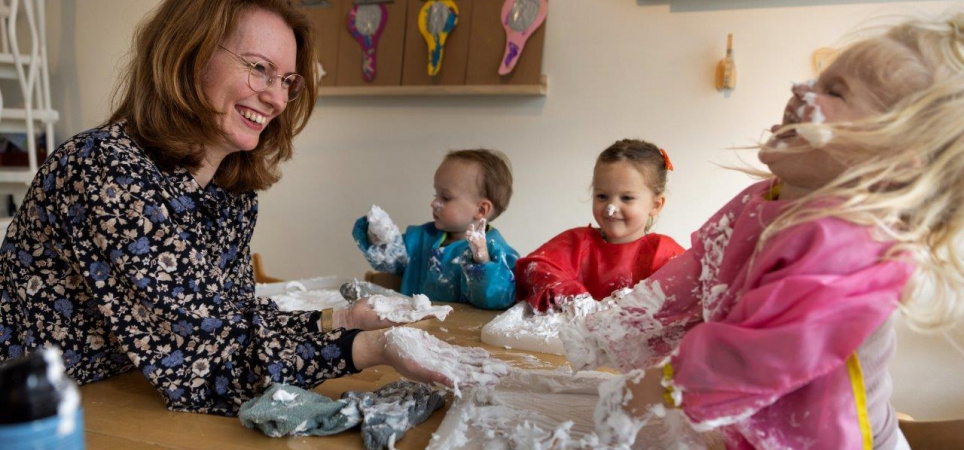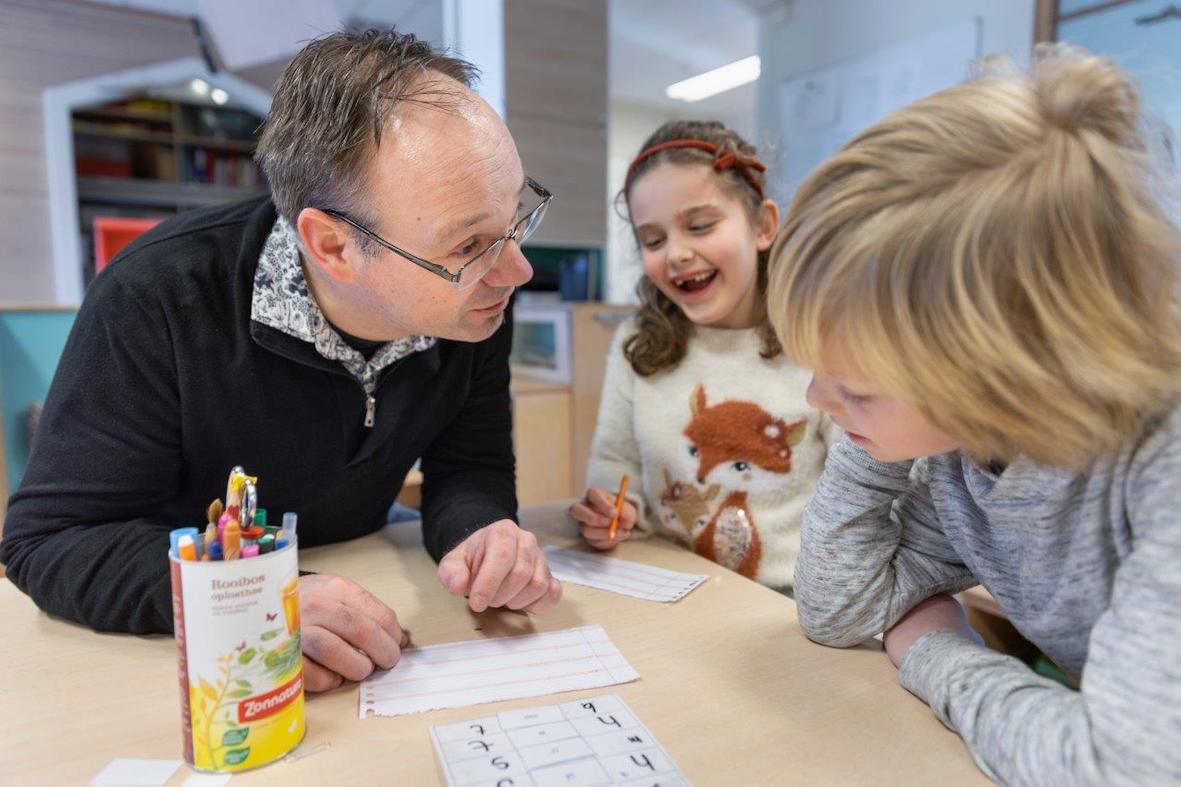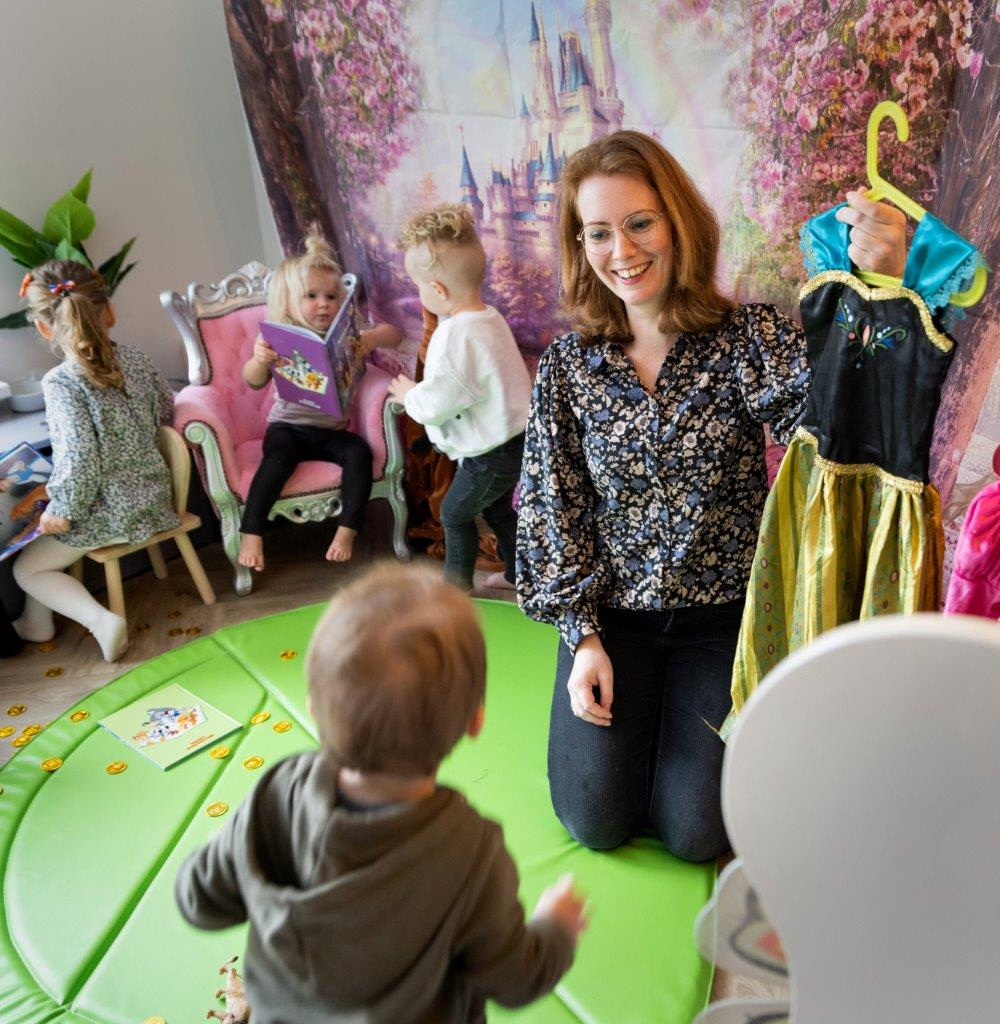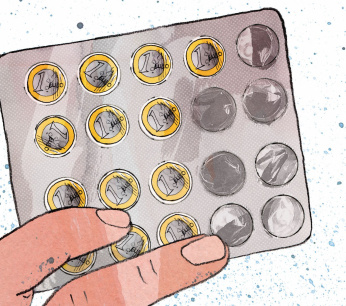Pedagogical educational professional bridges boundaries
More and more universities of applied sciences are offering the two-year higher professional education program Ad Pep: the Associate degree Pedagogical educational professional. Students are trained to bridge boundaries in their profession between education, youth care, childcare and social work. Three classes have already graduated in Zwolle.

Image: Herman Engbers
After his MBO diploma in Social Cultural Work, Johan van Lenthe from Zwolle worked for many years in after-school care and as a guest parent in childcare. Now that his own children no longer need childcare, he wanted something different. “Education appealed to me, but I'm 41 and a four-year teacher training course seemed too much to me,” he says. “The two-year Ad Pep program is completely in line with what I'm looking for: welfare, childcare and education come together.”
Ad Pep stands for associate degree Pedagogical Educational Professional and is a two-year part-time course at level 5. KPZ University of Applied Sciences started this course in 2016, together with Viaa University of Applied Sciences, the Regional Training Centers Landstede and Menso Alting and Prokino childcare in Zwolle.
Students we serve with this would otherwise not have ended up in higher professional education
Anne Looijenga, director of the knowledge and innovation center at KPZ University of Applied Sciences, was one of the founders: “We work in an interprofessional team of MBO and HBO teachers and with Reformed, Protestant Christian, public and Catholic denominations. I am proud of that, but also of the perspective: the students we serve with this, would otherwise not have ended up in higher professional education and are an enrichment for the professional field.”
This article is from the April Education Magazine. Do you want to stay informed of everything that is going on in education? Join the AOb and receive the Education magazine every month.
CHECK ALL THE BENEFITS OF MEMBERSHIP
The introduction of entrance exams for the PABO in 2015 and a looming student debt due to the loan system deter many MBO students from continuing their studies. In addition, the professional field requires broadly educated students. Looijenga: “Nowadays, a higher professional education graduate has to work at every location in childcare. The pedagogical educational professional knows the development of the young child and is eminently competent for this.”
Roles
Students are not so much trained for a specific position, but develop in four roles: that of pedagogical professional, connector, designer and initiator. According to Sandra Lugtenberg, team leader and educational leader of Ad Pep, this enables them to bridge boundaries between education, youth care, childcare and social work.
“They put the interests of the child first, can take control and bring together professionals from the living environment of the child to discuss what is needed. They are pedagogically well grounded and have insight into the development of children.”
That is exactly where the added value lies, adds Looijenga. “These professionals have a greater eye for the environment and have the courage to look behind the front door. You can try to raise the language level, but you will not succeed if a child is not doing well at home.”

First-year Ad Pep student Johan van Lenthe has been working as a teaching assistant at the Jenapleinschool in Zwolle since this school year. “Where as a childminder I mainly worked alone, I am now part of a large team and I really enjoy that. I support teachers in the middle school, which consists of five classes and more than two hundred students. I hope to play a role in the connection within and outside school after the training.” Image: Herman Engbers
It takes a village to raise a child. The African proverb is on the blackboard of the room where about fourteen freshmen teach Parent Neighborhood Involvement follow. “That looking after each other, which we also do here noabership mention, may come back a bit more”, says teacher Janine Tromp. “High parental involvement is also a strong predictor of child development.”
From the laptop, a student who follows the lesson online asks: "Sometimes I see that parents practice a lot with their children, but that this does not always give results, how is that possible?" Tromp explains: “Parent involvement is more than the focus on learning outcomes. If parents push and practice a lot for better performance, it can even backfire.”
I really like the practical approach. I can immediately apply what I learn
The class is a mixed group of mostly ladies. One has just left high school at the age of 19, another has been working for years. All students work a minimum of sixteen hours a week and attend school one day a week.
Student Mariska Melenhorst is enjoying the training. After her MBO diploma in teaching assistant in 2005, she started working as a pedagogical employee in childcare. With the Ad Pep training she finds the depth she was looking for, for example in a subject such as developmental psychology or the theme of an instructive learning environment.
Floor
“By consciously using language and adding real materials, I notice that play becomes more meaningful for a child. Children also really enjoy walking around with an empty butter tub, for example, although I sometimes have to explain to my colleagues that it is not waste”, she says with a laugh. She also finds the deepening in contact with classmates. “It is fun and educational to share our experiences.”
Johan van Lenthe agrees. He now works as a teaching assistant at a primary school. “Everything is new to me now, both my work and the training, which adds up to a lot. But it feels very good. I really like the practicality of the training. I can immediately apply what I learn.”

Mariska Melenhorst enjoys working as a pedagogical employee at the Kids&Joy daycare center in Slagharen. She finds the depth she was looking for in the two-year Ad Pep higher education course: “I learn a lot about children's behavior and how I can help them in their development. It is nice that I immediately apply what I learn and see how enthusiastically children respond to it.” Image: Herman Engbers
For the profession-oriented research course, second-year students work on their own research question. “What a great opportunity”, responds teacher Iris van Tellingen to a student's proposal to investigate the desired expansion of her primary school with a playgroup.
The purpose, main question and sub-questions of the research are explained on the interactive whiteboard. “I'm giving up, everything is whirling around in my head,” a student sighs. “For some, the pennies drop and others need more time,” says Van Tellingen reassuringly. "That's not bad at all."
The fact that students differ a lot from each other is an enrichment in the classroom, she explains a little later. “They learn from and with each other because they can cite examples from different fields. That translation into practice is the strength of this training.”
The fact that students differ so much from each other is an enrichment in the classroom
And that in itself is well appreciated, according to a recent study by KPZ University of Applied Sciences. Almost all graduates are satisfied with the training and have a paid job. About half have been given other tasks, responsibilities or a different position. For example, teaching assistants move on to the position of teacher assistant. About 10 percent have a combination function, for example in a child center where they work in both education and childcare. There are also areas for improvement: 40 percent still do exactly the same work as before the training and there are large differences in the remuneration of 'Pep'ers'.
Pabo
Less than 15 percent of the alumni go on to a higher professional education programme, half of which go to the PABO that they can obtain in 2,5 years. Anne Looijenga is happy about it: “We didn't want to create a kind of pre-pabo with the Ad Pep, but a program with an independent profile and we succeeded. At the same time, about 15 percent of the students are young havists. I can imagine that after working in the sector for a number of years they want to grow into a teaching position. In this way, the training will eventually contribute to a decrease in the teacher shortage.”
In the long term, the training will contribute to a decrease in the teacher shortage
Student Mariska Melenhorst does not yet know what she wants to do after this training. “Perhaps I like learning so much that I move on to the teacher training college.” Her fellow student Johan van Lenthe would prefer to fulfill a combination function. “I think it would be nice to coordinate between childcare, school and external parties and, for example, support the internal supervisor. But that position does not exist at my school now. When I have my diploma, I will consult with the management about what is possible.”
“It took years to break through collective labor agreements in the sectors and that was partly due to this training,” says Looijenga. “Most start in scale 4, 5 or 6 as a teaching assistant or childcare pedagogical employee and can progress to scale 6 or 7. Teacher assistants B in scale 8 are HBO-trained. They can design and test education independently. This is one scale below that of teacher. There is now a much more logical structure in the training and career perspective, but many employers are not aware of this yet.”
More publicity is mentioned in the research report as a solution, a matter of time, Looijenga thinks. “Our university of applied sciences alone already has two hundred graduates who influence the environment. After three years there are four hundred, then their input can no longer be ignored. These are also students who can create their own jobs.” Lugtenberg: “I hope that the professional field will become curious and will give them space. That can only benefit the development of children.”
Associates degrees are in demand
In 2013 the Associate degree (Ad) added to the higher education system. This two-year course at HBO level 5 is often developed together with the professional field and MBO. Higher education also has a bachelor's degree: a four-year HBO or three-year university degree at level 6. This is followed by a HBO or WO master's degree: a one- or two-year degree at level 7 or 8. In a large part of Europe, worked in this way, making degrees and titles comparable. The Ad courses are popular. So far, the number of students has grown by about 30 percent each year to more than 17.500 in 2020. Compared to 475.000 students in HBO and over 300.000 in WO.
For the research into the deployment of Pedagogical educational professionals, see kpz.nl/publications
Also read:'The number of support staff in primary education is growing rapidly'


